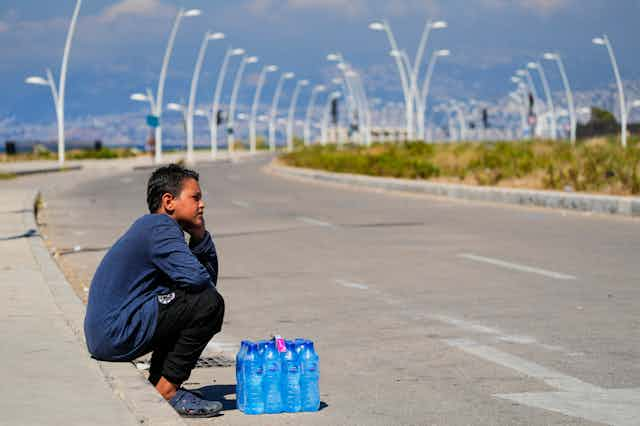We all have times when we feel anxious about our future; perhaps this is more acute for many people this summer, as we experience unprecedented wildfires and heat waves due to the warming climate. General anxiety intensifies climate or “eco”-anxiety.
This can spur some people to climate action, while for others it can lead to a state of paralysis and inactivity. Our recent Canadian study looked at how values and action around climate change vary with an individual’s personality traits. We found that the higher a person’s general anxiety trait and the more they valued nature, the more likely they would engage in climate action.
Last year the Intergovernmental Panel on Climate Change delivered a “final warning”; we must take action on climate change while there is still time.
Around the world, countries have declared climate emergencies to help motivate individuals and governments to act. Personal lifestyle changes such as switching to a vehicle that is not reliant on fossil fuels and reducing red meat consumption can have a large impact on greenhouse gas emissions if enacted on a global scale. But not enough people are making these changes, and this could be in part because of the level of anxiety they are experiencing.
Understanding climate anxiety
General anxiety is the tendency to worry about future events. An increase in anxiety can keep you alert and primed to perform your best, but once it exceeds a threshold, performance begins to deteriorate.
This can be a good thing, motivating us to prepare for an event, like studying before an exam or getting supplies before a storm hits.
But when worry becomes excessive or difficult to control, it can affect mental health and lead to generalized anxiety disorder, causing feelings of fatigue, restlessness and irritability, and reducing our ability to prepare.
Climate anxiety is when people worry about future environmental changes from climate change. It is not recognized as a pathological condition; in fact some have argued that it is a sane and overdue response to the climate crisis.
Read more: Climate anxiety is real. Why talking about it matters
For some people, climate anxiety is triggered by living through a climatic event, such as when a farmer loses crops to drought, or even just the thought of such an event. Moreover, people who have a strong connection to nature tend to have higher levels of climate anxiety, as they are more aware of the environmental changes happening around them.
Climate anxiety can be a motivating force for people to take action to reduce emissions, especially in wealthy countries. That being said, these actions tend to be around changing to a more sustainable diet and engaging in climate activism rather than on conserving resources or support for general climate policy.
Those in poorer countries in the Global South also experience climate anxiety, but economic and political barriers can limit climate actions at the individual level.

Greta Thunberg, a well known climate activist, used climate anxiety to motivate world leaders at the 2019 World Economic Forum saying, “I want you to feel the fear I feel every day. And then I want you to act.”
The fact that Thunberg — born and living in Sweden — is the popular face of climate activism is also somewhat representative of the weaker voice and agency experienced by many in the Global South.
Overdoing it
Too much climate anxiety can cause paralysis, preventing climate action. In this state, people can struggle to go to work or even socialize. They can experience panic attacks, insomnia, obsessive thinking and appetite changes. While individuals of all ages experience climate anxiety, more young people are reporting it, likely because of the profound impact climate change will have on their future and because they feel powerless to do anything about it.
Read more: Ten years to 1.5°C: how climate anxiety is affecting young people around the world – podcast
There must be a balance between sufficient anxiety to promote positive and urgent change in people’s behaviour, and not so much as to create paralysis.
Several interventions have been shown to be effective at lowering climate anxiety, including talking with a counsellor, going for a walk in nature and getting involved in climate action groups.
Moving forward
With more people experiencing climate anxiety, mental health practitioners need to be better educated around identifying symptoms and treatment options. Yet in Canada there is resistance to including climate change in the curriculum and professional training of social workers, who do most of the counselling.
Read more: Is 'climate anxiety' a clinical diagnosis? Should it be?
News media, social media and government publications are primary sources of information about climate change. Communicators in these areas can help reduce excessive anxiety from their climate messaging by using positive gain-framed messages. For example, saying “if we all reduce our weekly meat consumption by just 20 per cent, we can reduce our carbon footprint by 30 per cent!” Instead of the loss-framed “if we do not all immediately reduce our meat consumption by 20 per cent, the planet will be unable to support human life by 2050”. Both statements may be valid, but the former is more effective at spurring action.

Solution-orientated messaging is another effective technique to reduce anxiety. Governments can focus more on clearly articulating national action plans aimed at managing and reducing impacts, rather than continually reminding people of climate induced disasters that appear beyond their control.
The urgency of the climate crisis requires structural changes at all levels of society, but also meaningful action at the individual level; there is much we can and must do. Our level of anxiety and how well we are supported will help determine how successful our response to this challenge will be.

